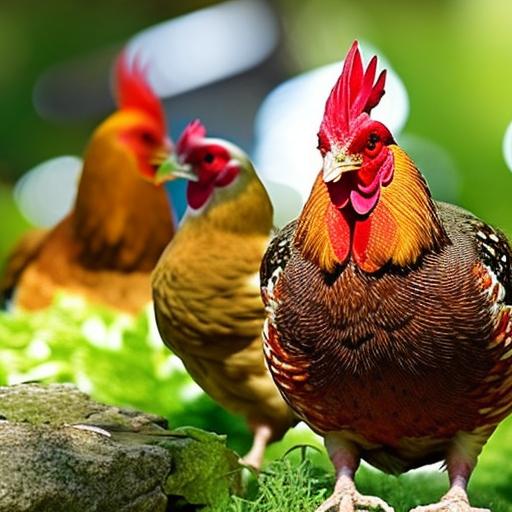Keeping chickens cool during the summer months is crucial for their health and well-being. Chickens are susceptible to heat stress, which can have negative effects on their overall health and productivity. There are several ways to create a comfortable environment for your chickens, including providing shade, proper watering, appropriate feeding, ventilation, and using cooling methods such as misters and fans. It is also important to maintain cleanliness in the chicken coop and monitor your chickens for signs of heat stress. By taking these measures, you can ensure that your chickens stay cool and healthy during the hot summer months.
Key Takeaways
- Keeping chickens cool during summer is crucial for their health and well-being.
- Creating a comfortable environment with adequate shade, proper watering, and appropriate feeding is essential.
- Ventilating the chicken coop and using cooling methods like misters and fans can help regulate temperature.
- Maintaining cleanliness in the coop is important to prevent heat stress and other health issues.
- Monitoring chickens for signs of heat stress and preparing for extreme heat with emergency measures is necessary.
Understanding the Importance of Keeping Chickens Cool during Summer
Chickens are particularly susceptible to heat stress because they do not have sweat glands like humans do. Instead, they rely on panting and spreading their wings to cool down. When the temperature rises above a certain threshold, chickens can struggle to regulate their body temperature, leading to heat stress. This can have negative effects on their health and productivity.
Heat stress can cause a decrease in egg production, poor egg quality, reduced feed intake, weight loss, and even death in extreme cases. Chickens that are exposed to high temperatures for prolonged periods of time can also experience respiratory distress, dehydration, and organ failure. It is important to take proactive measures to keep your chickens cool and prevent heat stress.
Creating a Comfortable Environment for Your Chickens
The ideal temperature range for chickens is between 65°F and 75°F (18°C and 24°C). However, chickens can tolerate temperatures up to 90°F (32°C) as long as they have access to shade, water, and proper ventilation. It is important to monitor the temperature inside the coop and make adjustments as needed.
Factors that affect the temperature inside the coop include the location of the coop, insulation, ventilation, and the number of chickens in the coop. The coop should be located in a shaded area away from direct sunlight. Insulation can help regulate the temperature inside the coop, keeping it cooler in the summer and warmer in the winter. Proper ventilation is crucial to allow fresh air to circulate and remove excess heat and moisture.
Providing Adequate Shade for Your Flock
| Metrics | Description |
|---|---|
| Number of Shade Structures | The total number of shade structures provided for the flock. |
| Shade Coverage Area | The total area covered by the shade structures. |
| Shade Material | The type of material used for the shade structures (e.g. fabric, metal, wood). |
| Shade Placement | The location of the shade structures in relation to the flock (e.g. near water source, feeding area). |
| Shade Duration | The amount of time the shade structures are available to the flock each day. |
Shade is essential for chickens to stay cool during hot weather. It provides a respite from direct sunlight and helps lower the temperature inside the coop. There are several ways to provide shade for your chickens. One option is to plant trees or install shade sails or awnings to create a shaded area in the chicken run. Another option is to use portable shade structures such as umbrellas or tarps that can be moved around as needed.
It is important to ensure that the shade structure covers a significant portion of the chicken run and provides enough shade for all the chickens. The shade should be positioned in a way that it blocks direct sunlight during the hottest parts of the day. Additionally, it is important to regularly monitor the shade structure for any damage or wear and tear, and make necessary repairs or replacements as needed.
Watering Your Chickens Properly
Water is crucial for chickens during hot weather as it helps them regulate their body temperature and stay hydrated. Chickens should have access to clean, fresh water at all times. It is important to regularly check and refill their water containers to ensure they have an adequate supply.
There are several ways to provide water for your chickens. One option is to use traditional waterers or troughs that can be easily refilled. Another option is to use automatic watering systems that provide a continuous supply of fresh water. These systems can be connected to a hose or water source and are designed to prevent spillage and contamination.
It is important to place the water containers in shaded areas to prevent them from heating up in direct sunlight. Additionally, it is important to regularly clean and sanitize the water containers to prevent the growth of bacteria and algae.
Feeding Your Chickens Appropriately during Hot Weather

Proper nutrition is important for chickens during the summer months to help them cope with the heat and maintain their overall health. It is important to provide a balanced diet that includes a mix of grains, protein, vitamins, and minerals.
During hot weather, it is recommended to feed your chickens smaller meals more frequently to prevent overeating and reduce the heat generated during digestion. It is also important to provide fresh fruits and vegetables that have a high water content, such as watermelon and cucumbers, to help keep your chickens hydrated.
Avoid feeding your chickens foods that are high in fat or protein, as these can increase their metabolic heat production. It is also important to avoid feeding them spoiled or moldy food, as this can lead to digestive issues and illness.
Ventilating Your Chicken Coop
Proper ventilation is crucial for maintaining a comfortable environment inside the chicken coop. Good ventilation helps remove excess heat and moisture, allowing fresh air to circulate. It also helps prevent the buildup of ammonia and other harmful gases that can affect the respiratory health of your chickens.
There are several ways to ventilate your chicken coop. One option is to install windows or vents that can be opened and closed as needed. These openings should be positioned in a way that allows for cross ventilation, with air entering from one side of the coop and exiting from the other side.
Another option is to use fans or exhaust systems to improve air circulation inside the coop. Fans can be placed strategically to create a breeze and help cool down the chickens. Exhaust systems can be used to remove hot air and moisture from the coop.
It is important to regularly clean and maintain the ventilation system to ensure it is functioning properly. This includes removing any debris or obstructions that may block airflow.
Using Cooling Methods, such as Misters and Fans
In addition to proper ventilation, there are several cooling methods that you can use to help keep your chickens cool during hot weather. One option is to use misters or sprinklers to create a fine mist of water in the chicken run. This can help lower the temperature and provide a cooling effect for the chickens.
Another option is to use fans or evaporative cooling systems. Fans can be placed strategically to create a breeze and help cool down the chickens. Evaporative cooling systems use the principle of evaporation to lower the temperature inside the coop. These systems typically involve the use of pads or panels that are soaked with water and air is passed through them, creating a cooling effect.
It is important to monitor the chickens’ behavior and adjust the cooling methods as needed. Some chickens may prefer to be directly under a fan or misting system, while others may prefer to stay in shaded areas.
Maintaining Cleanliness in Your Chicken Coop
Maintaining cleanliness in your chicken coop is important for the health and well-being of your chickens. A clean coop helps prevent the buildup of bacteria, parasites, and other pathogens that can cause illness.
Regularly cleaning the coop involves removing any droppings, soiled bedding, and debris. It is important to wear gloves and a mask when cleaning to protect yourself from potential pathogens. The coop should be thoroughly cleaned and disinfected on a regular basis, using a safe and effective disinfectant.
It is also important to regularly check for signs of pests such as mites or lice, and take appropriate measures to control them. This may involve using natural remedies or consulting with a veterinarian for treatment options.
Monitoring Your Chickens for Signs of Heat Stress
It is important to monitor your chickens for signs of heat stress during hot weather. Some common signs include panting, open-mouth breathing, lethargy, reduced feed intake, and drooping wings. Chickens may also seek out shaded areas or lie down on cool surfaces to try to cool down.
Regularly observing your chickens’ behavior and appearance can help you identify any signs of heat stress early on. If you notice any signs, it is important to take immediate action to help cool down your chickens and prevent further heat stress.
Preparing for Extreme Heat: Emergency Measures for Your Chickens
During periods of extreme heat, it is important to take additional measures to protect your chickens. This may include providing extra shade, using additional cooling methods such as misters or fans, and monitoring your chickens more closely for signs of heat stress.
It is also important to have a plan in place in case of a power outage or other emergency situation. This may involve having backup power sources for fans or cooling systems, having a supply of ice or frozen water bottles to help cool down the chickens, and having a plan for relocating the chickens to a cooler area if necessary.
Keeping chickens cool during the summer months is crucial for their health and well-being. By creating a comfortable environment, providing shade, proper watering, appropriate feeding, ventilation, using cooling methods, maintaining cleanliness, monitoring for signs of heat stress, and preparing for extreme heat, you can ensure that your chickens stay cool and healthy during the hot summer months. Taking these proactive measures will help prevent heat stress and its negative effects on your flock.
If you’re looking for ways to keep your chickens cool in the heat, you might also be interested in learning about the best kind of coop for chickens. Having a suitable coop can greatly contribute to their comfort and well-being. Check out this informative article on poultrywizard.com to discover the different types of coops available and find the perfect one for your feathered friends.
FAQs
What temperature is too hot for chickens?
Chickens can start to experience heat stress at temperatures above 85°F (29°C).
What are the signs of heat stress in chickens?
Signs of heat stress in chickens include panting, lethargy, loss of appetite, decreased egg production, and in severe cases, death.
How can I keep my chickens cool in hot weather?
You can keep your chickens cool in hot weather by providing shade, plenty of fresh water, and good ventilation in their coop. You can also give them frozen treats or add electrolytes to their water to help them stay hydrated.
What kind of shade is best for chickens?
The best kind of shade for chickens is natural shade from trees or shrubs. If natural shade is not available, you can provide artificial shade using tarps or umbrellas.
How often should I change my chickens’ water in hot weather?
You should change your chickens’ water at least once a day in hot weather, and more often if it becomes dirty or contaminated.
Can I use a fan to cool my chickens?
Yes, you can use a fan to cool your chickens, but make sure it is placed in a way that does not create a draft or blow directly on them.
What should I do if my chickens show signs of severe heat stress?
If your chickens show signs of severe heat stress, such as panting heavily or collapsing, move them to a cooler location immediately and provide them with cool water to drink. You can also try to cool them down by spraying them with water or placing them in a shallow pool of water. If their condition does not improve, seek veterinary care.
Meet Walter, the feathered-friend fanatic of Florida! Nestled in the sunshine state, Walter struts through life with his feathered companions, clucking his way to happiness. With a coop that’s fancier than a five-star hotel, he’s the Don Juan of the chicken world. When he’s not teaching his hens to do the cha-cha, you’ll find him in a heated debate with his prized rooster, Sir Clucks-a-Lot. Walter’s poultry passion is no yolk; he’s the sunny-side-up guy you never knew you needed in your flock of friends!







